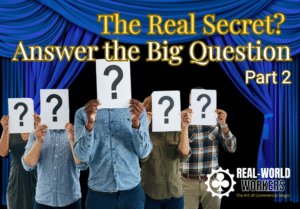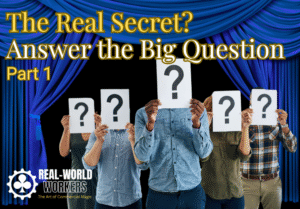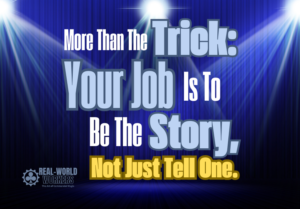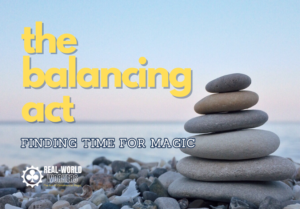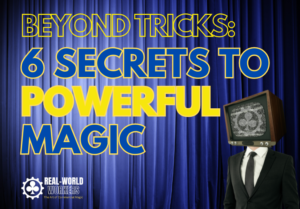More Than the Trick: Your Job Is to Be the Story, Not Just Tell One

More Than the Trick: Your Job Is to Be the Story, Not Just Tell One
Have you ever overheard someone talk about a magician they saw?
It usually goes one of two ways. They either say, “I saw a guy doing some tricks,” or they say, “I met a magician the other night.” Same basic situation. One leads to polite nodding. The other leads to, “Wait, what happened?”
That second one? That’s what you want.
Nobody rushes to tell their friends, “I saw this guy do a trick and tell a story about something that happened to someone else.” Nobody’s calling up a buddy to say, “Dude, I saw this magician who really knows the history of coins.” That’s not what sticks.
But when the magician, the person, makes an impression, now it’s a story. Now it’s something worth sharing. So what makes the difference?
One is someone doing tricks. The other is someone creating a moment.
Don’t Be a Script With Hands
You’ve probably seen it, and honestly, you’ve probably done it. I know I have. It’s the kind of performance where every word, every beat, every moment has been rehearsed within an inch of its life. It’s tight. It’s polished. But it’s also… kind of robotic. This type of performance makes it hard for audiences to connect with the performer.
It’s like watching someone read cue cards from inside their own head. The audience is just sort of there, along for the ride. And if someone interrupts, or sneezes, or breathes weirdly? You can feel the panic ripple through the performer like they just got hit with a Windows error message.
Now, don’t get me wrong, structure is good. Rehearsal is important. You should know what you’re going to say. But when the routine becomes a monologue, delivered at the audience instead of with them, it loses its magic.
It starts sounding like a lecture. It becomes a recital of words that worked once. And that’s when people say, “Yeah, I saw a guy doing some tricks.”
They don’t remember the guy. They don’t remember the moment. They remember… a trick.
The Problem with “Perfect”
Here’s the challenge: magic, by definition, is something everyone knows you’ve practiced. It’s precise. Controlled. Rehearsed to the point where the timing is baked in.
So how do you make that feel spontaneous? How do you make it seem like what’s happening is happening right now, for the first time, and will never happen again?
That’s not easy. Think about how many magic acts you’ve seen that truly felt like they existed only in that moment. Not last night. Not again tomorrow. Just this one show, for these specific people. That’s rare, especially in magic. But that’s exactly what makes you memorable.
If you want people to say, “I met a magician,” instead of, “I saw a guy doing tricks,” then something has to happen that feels unique to this audience, on this night. That’s where the magic lives—when it feels like it only happened once.
To pull that off, your performance needs to feel alive. Even if it’s fully scripted, it has to come off like it’s being created on the spot. That kind of spontaneity doesn’t just happen. It takes work. It takes intention. It takes acting chops.
I’ve always thought of magicians as highly specialized actors. You need all the skills of a solid performer plus the technical demands of a magician. You’re creating the illusion of magic, yes, but also the illusion of the first time.
When the audience feels like they’re seeing something that’s unfolding in real time, something that couldn’t be repeated exactly the same way again, that’s when they lean in. That’s what they talk about. Not just because the trick fooled them, but because the experience stayed with them.
Be in the Room
I’ve learned that the best performances happen when you stop trying to do the act to people and start doing it with them. Be in the room. Pay attention. Let go of the need to “get through the material” and start having real interactions.
It might mean pausing a joke that always gets a laugh because something better just happened in the room. It might mean riffing with someone who chimed in. It might mean completely scrapping your next line because something funnier just occurred to you.
In short, it means being human.
Now, that doesn’t mean you shouldn’t have a plan. You should. You should know your set inside and out.
But you should also know that the audience didn’t come to see your plan. They came to see you.
What Are They Actually Buying?
Here’s a little secret nobody talks about: most clients don’t book you for your tricks. They book you for the way people feel around you.
They want guests to be surprised. Delighted. Entertained. They want to hear people laugh and say, “That magician was amazing.” You can’t script that.
That comes from being present. From treating each show like it’s the only time that set will ever happen, because, in a way, it is. You’re not just doing magic. You’re creating a moment. A memory. A story they’ll tell the next day.
And if you’re lucky, they’ll even remember your name.
Try This at Your Next Gig
Next time you go out to perform, try something: listen more than usual. Slow down. React.
If someone interrupts, don’t power through; engage. If a joke doesn’t land, pivot. If someone gives you something to work with, take it. Don’t just run the script. Let the show breathe.
Magic is one of the only art forms where your audience is right there with you, talking, laughing, responding in real time. Use that. It’s a gift.
Lean into the moments you can’t rehearse. That’s where the real magic lives.
In the End…
You get to decide what people say about you after the show. Will they say, “We saw some guy doing tricks”? Or will they say, “We met a magician the other night”?
They’re not talking about the story. They’re not talking about the moves. They’re talking about the moment. And those moments happen when you’re there for it, not just running the playbook.
So next time you perform, try showing up as a person first—and a magician second. The tricks will be better for it.
Build Moments That Stick. Not Just Tricks That Work.
This idea of being the moment is just one layer of what we’re building inside the Worker’s Studio Sessions—a live workshop that meets every other Sunday night for magicians who want their acts to connect, not just fool.
Right now, we’re in the middle of The Premise Workshop—a working lab where we’re building meaning into our magic, one routine at a time. You can catch up on the first two sessions and jump into the next one live.
Click here to catch up, watch the sessions, and save your spot.
This isn’t a course you’re behind on. It’s a real-time workshop for your act. Come build with us.


